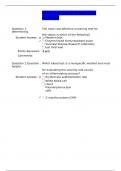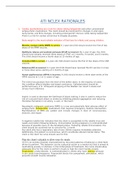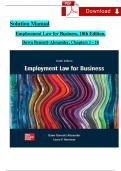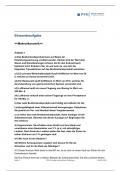Psychology of sport & exercise
1. Introduction to the field=
- Introductie=
• Defenitie: portpsychologie is de wetenschappelijke studie van mensen en hun gedragingen
in (bewegings- en) sportactiviteiten en de praktische toepassing van die kennis.
• 2 manieren om sportpsychologie te studeren:
A) SPORT->PSY: Effecten van sport op het mentale welzijn:
→Bv: Will anxiety reduced and the confidence grow by regular jogging?
B) PSY->SPORT: Effecten van mentale welzijn op de sport:
→Bv: To what extent does pressure and tension determine the performance of an
athlete?
- Types of psychology=
- Psychologie of sport=
• Goal: Teach people to optimally perform/enjoy a sports setting.
• Target group: anyone who wants to improve their sporting performance (including non-
elite)
, - Essentials=
• The core of psychology of sport= learning systematic training of mental skill.
• It takes time to learn a mental skill and it takes time.
• Catastrophic thinking= when something went wrong, you think everything is lost.
• Docent meaning= it’s not real that they say “if you believe in it, you can do anything” or “if
you’re a nervous guy with mental skills training, you can be an chill guy”,… BUT he does
believe that you can “train” your anxiety that you can perform better.
• How do you need to see mental skill training?= The genes (biology, nature) holds
culture/nurture on a leash.
➔ Bv: a dog on a leash can go his own way, BUT there is a limit.
• Rethinking= avoid losing games that you can should have won.
➔ Evenepoel was the favorite but one day he had a major dip (= a mental issue) but the
day after he won the big race.
- For who is mental skill training useful?
• Especially for Elite athletes, competitive players & recreational athletes
➔ Tennis players
• But also amateur sports (=when u want to play because you want to have fun)
• Individuals & teams
• Children & adults
• Persons with a physical or mental handicap
- Sport psychology techniques=
• They are not restricted to atlhetes
• Because of the pressure by athletes, sport psychology has grown (bv: immigery)
• Most used outside of the field of the sports
• First the councillors were used to be the (sport) psychologists but now they have
professional help.
➔ (especially by sports like: dance, music, theatre, army, …)
- Difference between sport psychologist – mental coach=
Sport psychologist Mental Coach
Legally protected NOT legally protected
Often comes with some stigma More easily accepted
GOAL= clinical questions GOAL= improve mental skills
Became a scientific discipline in 1893-1920 Every coach is also a mental coach
(by Norman Triplett)
Every training is also a mental training
(= you cant see mental training as an other subject or
thing.)
- Sport psychology in 3 roles=
1) Teaching
2) Consulting
3) Research
,- Norman Triplett=
• 1861-1934
• Observation: do cyclists on track ride faster in company than alone?
• 1st published sport psychological experiment
(→Children where better in fishing alone than doing things in group)
• Explained it with social facilitation.
- Development/ process of scientific knowledge (kennis)=
• Sport- & exercise psychology both make use of the scientific method=
➔ Collecting knowledge by doing observations.
➔ This knowledge can be replicated & the test predictions can be falsified.
• Intern & extern validity=
➔ Intern: Are we sure that the result or effect we see, can not be a coincidence or
disruptive/distracting factors.
(= we are evaluating the design, procedure, effect size?, enough power?, the group that
has been tested,…)
➢ Limitations=
1) Self-reports about use of mental techniques: valid and reliable?
2) Self-report about criterium/performance: valid and reliable?
3) Differentiation between the techniques?
4) Personal best on 10 k as performance index?
5) Statistical power for correlation= n=100 at the least,otherwise very sensitive for
outliers.
6) Confounding variables (e.g., level of runner)
7) No conrol group => risk of size effect, learning effect
8) Small (statistical) power by small sample size (=6people)
9) Mutual influencing by players ?
10) Expectancy bias by coach who is also the researcher.
➔ Extern: how sure are we that it can be generalized to other populations and situations.
→If the internal validity is good enough= how sure are we that we can find the same
findings in other populations or other situations?
(= evaluate samplings, representativeness,…)
(=Can everybody participate in our research?)
➢ Limitations=
1) Self-selection (only runners sampled who are open formental techniques) =>
not representative for all athletes
2) Only male runners => can findings be generalized to- other sports?- females?-
other countries/regions
3) Does it also work under pressure in a game?
4) Effects on what? Does it only work for free-throws or also on playing better in
general?
, Topic 1: Assignments
- Assignment last week=
• Story: about the coach who want to improve the free throws by doing mindfulness sessions
and it worked.
• What are the 3 main limitations in term of internal validity of this resurge?
1) The experimental group is to low, they are only with 6six players & the outcome is not
that much better/ higher.
→She need more players
→More free throws then just 10.
2) Even if you would do the analysist, this difference is not proved to be statistically
significand/meaningful.
3) The coach has manipulated something, she did a mindfulness session.
→You need to still have a group that will be analyzed but didn’t do the session (= we
can see then the learning effect.)
4) You only have volunteers from the basketball team participating and no other people.
As a result, the outcome will not be complete enough for general conclusions because
no other people (like not sportive human) were tested.
- Scientifics VS practical knowledge=
Science Practice
Reliable (betrouwbaar) Less reliable (minder betrouwbaar)
Systematic & controlled Often lack of explanation
(vaak gebrek aan uitleg)
Objective & less biased Very sensitive for bias
(minder bevooroordeeld)
Limited direct practical value Holistic
(beperkte praktische waarde)
Reductionistic Innovative
Slow evolution Immediate (onmiddelijk)
- The most important steps in an experiment=
1. Introduction to the field=
- Introductie=
• Defenitie: portpsychologie is de wetenschappelijke studie van mensen en hun gedragingen
in (bewegings- en) sportactiviteiten en de praktische toepassing van die kennis.
• 2 manieren om sportpsychologie te studeren:
A) SPORT->PSY: Effecten van sport op het mentale welzijn:
→Bv: Will anxiety reduced and the confidence grow by regular jogging?
B) PSY->SPORT: Effecten van mentale welzijn op de sport:
→Bv: To what extent does pressure and tension determine the performance of an
athlete?
- Types of psychology=
- Psychologie of sport=
• Goal: Teach people to optimally perform/enjoy a sports setting.
• Target group: anyone who wants to improve their sporting performance (including non-
elite)
, - Essentials=
• The core of psychology of sport= learning systematic training of mental skill.
• It takes time to learn a mental skill and it takes time.
• Catastrophic thinking= when something went wrong, you think everything is lost.
• Docent meaning= it’s not real that they say “if you believe in it, you can do anything” or “if
you’re a nervous guy with mental skills training, you can be an chill guy”,… BUT he does
believe that you can “train” your anxiety that you can perform better.
• How do you need to see mental skill training?= The genes (biology, nature) holds
culture/nurture on a leash.
➔ Bv: a dog on a leash can go his own way, BUT there is a limit.
• Rethinking= avoid losing games that you can should have won.
➔ Evenepoel was the favorite but one day he had a major dip (= a mental issue) but the
day after he won the big race.
- For who is mental skill training useful?
• Especially for Elite athletes, competitive players & recreational athletes
➔ Tennis players
• But also amateur sports (=when u want to play because you want to have fun)
• Individuals & teams
• Children & adults
• Persons with a physical or mental handicap
- Sport psychology techniques=
• They are not restricted to atlhetes
• Because of the pressure by athletes, sport psychology has grown (bv: immigery)
• Most used outside of the field of the sports
• First the councillors were used to be the (sport) psychologists but now they have
professional help.
➔ (especially by sports like: dance, music, theatre, army, …)
- Difference between sport psychologist – mental coach=
Sport psychologist Mental Coach
Legally protected NOT legally protected
Often comes with some stigma More easily accepted
GOAL= clinical questions GOAL= improve mental skills
Became a scientific discipline in 1893-1920 Every coach is also a mental coach
(by Norman Triplett)
Every training is also a mental training
(= you cant see mental training as an other subject or
thing.)
- Sport psychology in 3 roles=
1) Teaching
2) Consulting
3) Research
,- Norman Triplett=
• 1861-1934
• Observation: do cyclists on track ride faster in company than alone?
• 1st published sport psychological experiment
(→Children where better in fishing alone than doing things in group)
• Explained it with social facilitation.
- Development/ process of scientific knowledge (kennis)=
• Sport- & exercise psychology both make use of the scientific method=
➔ Collecting knowledge by doing observations.
➔ This knowledge can be replicated & the test predictions can be falsified.
• Intern & extern validity=
➔ Intern: Are we sure that the result or effect we see, can not be a coincidence or
disruptive/distracting factors.
(= we are evaluating the design, procedure, effect size?, enough power?, the group that
has been tested,…)
➢ Limitations=
1) Self-reports about use of mental techniques: valid and reliable?
2) Self-report about criterium/performance: valid and reliable?
3) Differentiation between the techniques?
4) Personal best on 10 k as performance index?
5) Statistical power for correlation= n=100 at the least,otherwise very sensitive for
outliers.
6) Confounding variables (e.g., level of runner)
7) No conrol group => risk of size effect, learning effect
8) Small (statistical) power by small sample size (=6people)
9) Mutual influencing by players ?
10) Expectancy bias by coach who is also the researcher.
➔ Extern: how sure are we that it can be generalized to other populations and situations.
→If the internal validity is good enough= how sure are we that we can find the same
findings in other populations or other situations?
(= evaluate samplings, representativeness,…)
(=Can everybody participate in our research?)
➢ Limitations=
1) Self-selection (only runners sampled who are open formental techniques) =>
not representative for all athletes
2) Only male runners => can findings be generalized to- other sports?- females?-
other countries/regions
3) Does it also work under pressure in a game?
4) Effects on what? Does it only work for free-throws or also on playing better in
general?
, Topic 1: Assignments
- Assignment last week=
• Story: about the coach who want to improve the free throws by doing mindfulness sessions
and it worked.
• What are the 3 main limitations in term of internal validity of this resurge?
1) The experimental group is to low, they are only with 6six players & the outcome is not
that much better/ higher.
→She need more players
→More free throws then just 10.
2) Even if you would do the analysist, this difference is not proved to be statistically
significand/meaningful.
3) The coach has manipulated something, she did a mindfulness session.
→You need to still have a group that will be analyzed but didn’t do the session (= we
can see then the learning effect.)
4) You only have volunteers from the basketball team participating and no other people.
As a result, the outcome will not be complete enough for general conclusions because
no other people (like not sportive human) were tested.
- Scientifics VS practical knowledge=
Science Practice
Reliable (betrouwbaar) Less reliable (minder betrouwbaar)
Systematic & controlled Often lack of explanation
(vaak gebrek aan uitleg)
Objective & less biased Very sensitive for bias
(minder bevooroordeeld)
Limited direct practical value Holistic
(beperkte praktische waarde)
Reductionistic Innovative
Slow evolution Immediate (onmiddelijk)
- The most important steps in an experiment=







